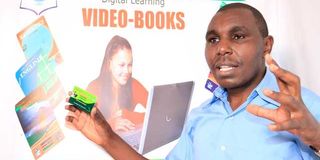Out with the chalk and slate, in with video books!

Lawrence Wangereka, 31, displays a specially designed flash drive which is loaded with academic content at his office in Ruiru.
What you need to know:
- Lawrence says that he has begun developing content for deaf students, incorporating sign language interpreters to cater to the needs of students with special needs.
- Since he started on this journey seven years ago, Lawrence has offered his video books to about 600 schools in Meru and Muranga, and sold it to hundreds of thousands of parents.
Many schools in Kenya today do not have adequate teaching staff, and this no doubt interferes with the learning process of school going children.
It is this particular challenge that pushed Lawrence Wangereka to action. In 2013, he founded Global Link Academic Agency and came up with an invention that would assist learners to go through their coursework or syllabus using animated video books.
The video books he makes cover the whole curriculum as outlined by the Kenya Institute of Curriculum Development (KICD). Basically, he takes the contents of the designated textbooks and creates audiovisual lessons out of them, or 3D animations where applicable.
“During the learning process, some learners quickly grasp the lessons while others find it difficult to do so. My visual book not only excite learners, the colourful illustrations also allow them to interact more easily with the academic content, and to memorise the concepts faster,” says the 31-year-old developer who is a graduate of biomedical science and technology from Egerton University.
Peer counselling
This idea was hatched and developed while Lawrence was still in campus, when he realised that most of his fellow students relied on past papers to revise.
“I was a member of a club called I Choose Life Africa, and we were trained on several issues including peer counselling and HIV/AIDs prevention and management. In one presentation, the facilitator used a video animation to show how the human immunodeficiency virus moves and operates within the body, hijacking the CD4 cells and developing bad cells which end up compromising the body’s immune system. The clip lasted just 30 seconds, but I could see that it had a lasting impact on the audience. Everyone in the room was paying attention throughout the session, which was fascinating to me.
“The facilitator of that session had just managed to squeeze a complicated, 10-page document into a powerful, 30-second video, and the impact was phenomenal. The first thing I thought about after that session was to create a video book. The more I thought about it, the more I got convinced that I had found a befitting solution to the teacher shortage crisis in the country,” he said.
Audio-visuals books are defined as video versions of either primary or secondary school textbooks as provided by KICD.
“We usually take the prescribed syllabus but instead of producing text books, we produce videos. The video books contain audio narrations accompanied by visual 3D-animations and practical demonstrations of every topic in the syllabus,” he explains and adds that each video book is loaded with one year’s worth of lessons for a particular subject, and the lessons are divided into topics which one can select from the main menu.
“We are working with consultants who are teachers attached to schools in various parts of the country. They review our work before we release it to the market. Currently, we have produced mathematics, chemistry, biology, physics, and geography video books covering the syllabus from Form 1 to Form 4,” says the innovator.
Lawrence notes that the use of video animation in teaching can help save up to 30 per cent of teaching time, which translates to better and faster coverage of the syllabus, while at the same time tackling the problem of inadequate staffing in some schools.
And now that the Covid-19 pandemic has interrupted physical learning, he says, these books can enable learners to continue studying from the comfort of their homes. Lawrence says that he has begun developing content for deaf students, incorporating sign language interpreters to cater to the needs of students with special needs.
“We are in talks with an organisation called World Possible Kenya which is selling an offline learning gadget called RACHEL server (Remote Area Community Hotspot for Education and Learning). We plan to pre-load the content on their servers so that our clients can better access our products,” says Lawrence.
Since he started on this journey seven years ago, Lawrence has offered his video books to about 600 schools in Meru and Muranga, and sold it to hundreds of thousands of parents. The content is available on their website https://highimpactscience.co.ke/our-courses/.
Free online lessons
“The online lessons are free for one month. Those who are unable to access the internet can still get our products in the form of DVDs or in flash disks which can be purchased in bookshops in Nairobi, or ordered directly from our website,” he explains.
Some of the challenges he has faced include piracy, which forced him and his colleagues to enhance the books’ security features. This, however, ended up limiting the use of the video books to computers.
“Remember, we wanted a product that could be used together with simple household gadgets such as TVs.
“Sometimes we meet people who are quite technophobic and averse to change. They want to hold on to the traditional teaching and learning methods of using a chalk and blackboard, and we end up spending so much time trying to persuade them to acquire the video books,” observes Lawrence, adding that he mostly meets teachers and parents who are receptive, and learners who are dynamic and ready to try the new method of learning.
However, he laments that the vetting and approval process by KICD is quite expensive and unaffordable for most content creators.





